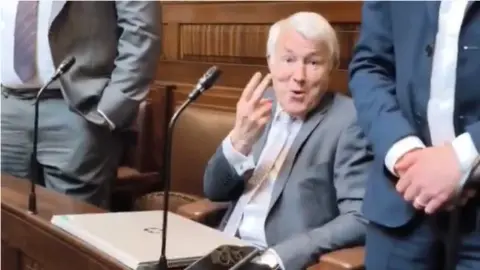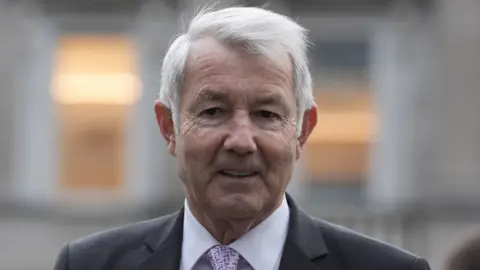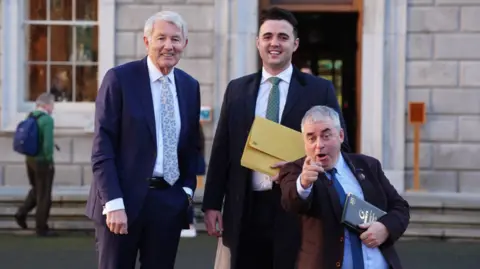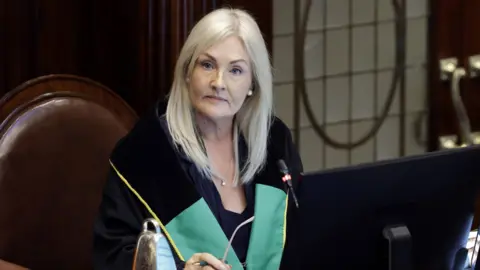Politician says no offence meant by two-finger gesture
 Copyright - Paul Murphy TD
Copyright - Paul Murphy TDA two-finger gesture by an Irish Parliamentarian has been prominent across social and mainstream media this week.
The politician in question, a highly controversial member of the country's national parliament, subsequently insisted that he meant no offence.
Michael Lowry explained that it was taken out of context, was "not made with malicious intent" and he said it was "not intended to be offensive or to cause offence".
By then, for many people in Ireland, it was too late, and his explanation didn't really matter.
 PA
PAWhat mattered much more was that many people in the country felt his gesture was in keeping with the "shocking" and "disgraceful" scenes witnessed in the chamber in the preceding hour or so.
In the public mind, Lowry's two fingers towards a political opponent spoke louder than any words about the standard of behaviour in the Dáil (lower house of the Irish Parliament) on Tuesday.
No wonder then that newspapers around the country, and beyond, used the image prominently - a classic case of a picture painting many words.
Who is Michael Lowry?
What people outside Ireland could not be expected to know is that the image had added significance for people in Ireland, simply because it was Lowry.
He is a veteran Irish politician whose role in a political and business scandal was found by a tribunal, into certain payments to politicians and related matters, to have been "disgraceful and insidious".
Lowry said the 2011 report was "factually wrong and deliberately misleading", and that the opinions of the Tribunal chairman, Mr Justice Moriarty, were "not substantiated by evidence or fact".
Fast forward to the aftermath of the most recent Irish General Election in November last year.
Lowry was regarded as a kingmaker in the discussions to form a new government.
He was, therefore, viewed as a pivotal player in the build-up to this week's parliamentary session that turned into one of the most disruptive sittings of the Dáil in recent memory,
Of course, he cannot be blamed for the behaviour of hollering and heckling opposition TDs (members of parliament).
 PA
PASupport from independents
But it is a fact that he is widely regarded in the country as the de facto leader of one group of Independent TDs who agreed to support the new Irish government.
In return, the two big parties in the coalition, Fianna Fáil and Fine Gael, supported the election of a member of that independent group, Verona Murphy, as Speaker of the Dáil.
The independent bloc, with Lowry leading their negotiations, then secured a number of junior ministries for some other members of their relatively small group.
These appointments helped to seal the deal for the formation of the new Irish government.
The public and political consensus at the time was that members of the group had succeeded in punching well above their weight.
But Lowry, as the leader of his group, still wanted more.
What is the 'speaking rights row'?
Lowry demanded Dáil speaking rights for the remaining members of his government-supporting group, including himself - the ones who did not land plum jobs in the government formation talks.
That single demand by Lowry at the end of last year was a lightning rod for the opposition.
They were of the view that a small group of independent TDs who committed to support the government in good and bad days were then wanting Dáil time to ask questions of the same government.
The opposition believed this would use up valuable parliamentary time that should be reserved for opposition TDs to hold the new government to account.
The opposition parties crystallised Lowry's proposal in the simple mantra "You can't be in government and opposition at the one time".
Allow X content?
So, this was the catalyst for a parliamentary flare-up which delayed the appointment of the new Taoiseach Micheál Martin in January, and again the dispute about this single issue culminated in the chaotic scenes in the Dáil this week.
It was also noteworthy that the Speaker, Verona Murphy - who now faces a motion of no confidence from the opposition over her handling of the proceedings last Tuesday - was put forward for the post by Lowry's independent group, as part of their deal to support the new government.
 PA
PASo, when Lowry flashed two fingers, in what he himself later described as an "an errant gesture under provocation", other members of the Dáil were not the only people in Ireland who had their own view about what the gesture represented.
In his own words, Lowry said he meant no offence but that did not stop people around the country making up their own minds about the symbolism of a two-finger gesture in the national parliament on a day of chaotic and unruly scenes in the Dáil.
